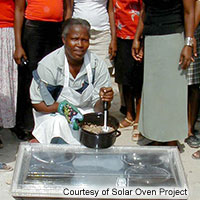Solar Oven Partners UMC

Project Information
Empowering people to use solar energy to meet their cooking needs
Describe the need affecting community
How will this Advance project help to address the need?
The new solar oven training and distribution program in the DR is already underway. Shipments containing 1,130 solar ovens and 5,380 black enamel cooking pots have been received in the DR between July 2015 and February 2016, with 60-70 solar oven kits distributed thus far (February 2016). Work in establishing the program is ongoing under the direction of the IED and the Graners, with support from UMVIM teams (next scheduled team is March 7-18, 2016) organized by the Dakotas conference. Production of solar ovens in the Dakotas is also ongoing as work has begun on another sea container shipment of 1,150 solar ovens. Volunteers are being recruited and scheduled to serve in our 3 workshops in the Dakotas as well as for mission travel to the DR. The financial commitment for providing 1,150 solar oven kits, including transportation to the DR via sea freight, is currently about $130,000. Funding comes from a variety of efforts including promotion through The Advance, targeted fundraising, personal contacts, and grant writing. United Methodists from across our connectional church are the primary source of thousands of hours of volunteer service and many more thousands of mission dollars. To create ownership, IED has determined that each new solar cook will pay 1,000 Pesos (~US $22) to receive their solar oven kit, after attending a required 2-day training seminar. The seminars educate users on the concepts and benefits of using free solar energy, as well as, providing hands-on training in the assembly, use and cooking of various meals for their families. All funds collected from the training/distribution efforts will be used by the IED for program operation. The personal investment to attend the training and pay for the solar oven—though less than the actual costs—provides amazing return on investment with savings in fuel and bottled water costs over years.
Describe the primary goal of the project
The primary goal and long term impact are essentially the same as the objectives and immediate impact addressed in the next question, but multiplied. Cost savings on fuel to cook daily meals. Health benefits from pasteurizing drinking water and avoiding smoke inhalation from cooking fire. The conservation from helping to stem the tide of deforestation can all be achieved on a personal level, but also with impacts that are multiplied to benefit communities. Even nations and the world, given a sustained effort to train individuals and provide them with the opportunity to invest in solar cooking. That is a God-sized vision, so the project goal becomes sharing with the poor after the example of Mother Teresa, or one oven…one oven…one oven.
Describe the change you would like to see in the community as a result of this Advance project
An improved quality of life for families, including more discretionary income resulting from the savings realized by cooking many of their meals without a cost for cooking fuel. Specifically, our hope and prayer is to see savings invested in better family nutrition and education of children.
Contact Information
Christopher Sylvah
director@solarovenpartners.org
https://solarovenpartners.org

